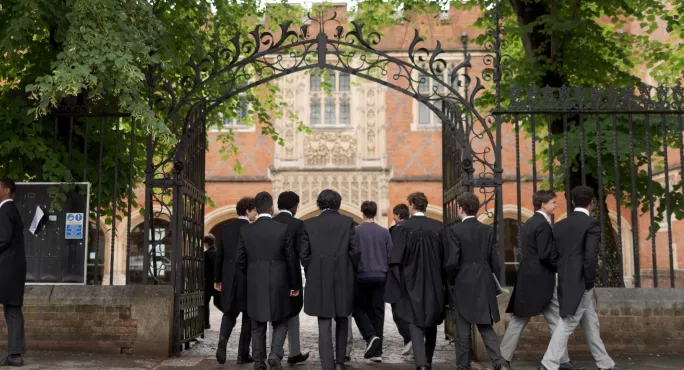The news that Eton College and Star Academies had formed a partnership to create three new sixth-form colleges in the Midlands and the North met with a warm reception from many key stakeholders. Conversely, understandable concern has been expressed in some quarters about the selectivity of these colleges.
This is a matter that we have considered extremely carefully as we have planned this project.
Access to the UK’s top universities is deeply unequal across the UK. This inequality is shown in the number of offers made by Oxford and Cambridge universities to able students from different regions.
University entry
In 2019, only around 180 offers were made to sixth-formers in the whole of the North East, from a region that has around 33,000 18-year-olds. This disappointing figure is arguably a reflection of regionally unequal performance at A level.
Only around 7,000 students in the North East sat A levels in 2019, and just over 900 of them achieved grades AAA or better.
This compares to 6,500 top-performing students in London in the same year and almost 7,000 in the South East.
Even accounting for contextual differences between pupil populations, almost twice the proportion of young people in the South East get AAA or better compared to the North East.
The four highest-performing regions in England are all below the Severn to the Wash line; above that, the relative levels of success are lower.
A-level outcomes
The scale of this educational divide led us to undertake a detailed feasibility study into outcomes in “coldspot” areas in the Midlands and the North. This analysis underpins our focus on towns and cities in the UK where young people succeed in attaining strong GCSE results but where this achievement does not feed into top outcomes in terms of university entrance, and our reason to opt for a high degree of selectivity.
Our aim is ambitious but it has been carefully planned over the past year. We have discovered commonality of interest and synergy of approach between our educational institutions. This is a true and equal partnership.
Curriculum offer
Genuine partnership is evident in our plans for teaching and learning. We will take the academic excellence, pastoral support and social commitment of Star, along with the knowledge-rich rigour of the Eton schoolroom, to create a pedagogy we believe will be distinct in its offering. We intend that our colleges will change lives for disadvantaged children and complement the work to raise standards that already features in these regions.
Star Academies will run the new colleges, which will be part of the trust’s national network of schools. Eton, meanwhile, will contribute expertise through its world-class curriculum and pedagogy, as well as providing the additional funding required that will support these colleges as they deliver an enhanced educational offer.
What will be studied? We will offer an unapologetically academic curriculum of core A-level subjects, which continue to be the passport to many courses at prestigious universities. They will be delivered through face-to-face teaching within the colleges. We have a strong commitment to extending beyond the core curriculum through a series of online courses that will enhance the Star-Eton college experience and set students up for success.
Added value
We are looking take students beyond the “standard” offer, to explore topics that are not part of mainstream curricula. We will fill in the gaps between disciplines, such as exploring the relationship between mathematics and philosophy. We will offer subjects such as archaeology and anthropology, that are uncommon at A level but studied at university.
We will design, manage and quality assure these online courses, which will, initially, be delivered remotely by Eton masters within their usual timetables. Eton will also be open to opportunities for the physical deployment of teachers to these new colleges to enhance collaboration, deepen relationships and foster mutual understanding between our organisations.
We are clear, though, that these plans are just the beginning. We are in no doubt that this partnership will evolve and flourish into a true, long-standing collaboration, with each partner playing to their strengths and learning from each other.
We would like to learn from and share with the wider education community as we embark on this journey. Hopefully, by sharing our vision we can begin that process from the outset.





